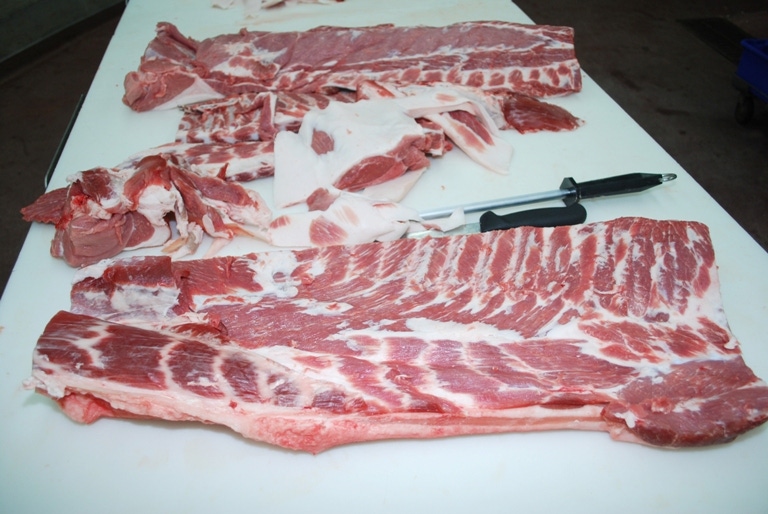
By Mike Dorning
More than half of workers at some American meat plants tested positive for coronavirus. Employees are still out sick, keeping production slow even as some facilities reopen, and grocers from Kroger Co. to Costco Wholesale Corp. are rationing supplies. Even Wendy’s Co. dropped burgers from some menus.
Prices for wholesale beef and pork have jumped more than 20% since President Donald Trump’s historic executive order to keep plants running during the pandemic. The supply shortfalls and soaring prices underscore the challenges of quickly fixing America’s broken meat supply chain.
A Tyson Foods Inc. plant in Perry, Iowa, had 730 positive cases, representing 58% of employees, Sarah Reisetter, deputy director for the state’s health department, said Tuesday. Even as Trump signed the order last week, analysts and experts warned not to expect a quick rebound for meat supplies.
Meat supplies for retail grocery stores could shrink almost 30% by Memorial Day, leading to retail pork and beef price inflation as high as 20% relative to prices last year, according to agricultural lender CoBank.
Iowa-based Hy-Vee Inc. on Tuesday became the latest grocery to put some limits on meat purchases. Shake Shack Inc. executives warned investors a day earlier to expect much higher beef prices.
Production is concentrated in the hands of a few companies largely relying on massive regional processing facilities staffed with workers jammed into close quarters. For bottlenecks to ease, those factories need to come back at full speed -- a formidable task given the need to ramp up safety measures and an increase in employee absenteeism.
Meat plants have created coronavirus hot spots across America’s rural heartland as the disease spread quickly among employees who report in their thousands each day to work in elbow-to-elbow conditions on processing lines that move at lightning speed.
Iowa’s Department of Public Health on Tuesday revealed massive coronavirus outbreaks at several major meat processing facilities in the state. In addition to the infections at the Perry plant, a Tyson facility in Waterloo had 444 positive cases, or 17% of employees. Iowa Premium National beef in Tama had 258 cases, 39% of employees.
U.S. Agriculture Secretary Sonny Perdue said that as plants reopen, shortfalls could still run as high as 15%. He cautioned that facilities may run below prior capacity for some time in order to comply with safety guidelines set by the Centers for Disease Control and Prevention.
Trump’s order will prioritize orders for protective gear and testing kits for meat workers -- a key component to get plants back up and running, and some have started the process.
Tyson said Tuesday it was resuming limiting production at its Pasco, Washington, beef facility. Smithfield Foods Inc. on Monday restarted a meat-processing plant in Wisconsin, and the company will bring operations back at its South Dakota pork plant in a “day or two,” according to Governor Kristi Noem.
But many facilities still remain closed, and those that are reopening could be forced to run lines at a slower pace because of social-distancing measures and absenteeism.
Through Tuesday, processors this week slaughtered 35% fewer cattle than the same two days a year ago and 39% fewer hogs, according to the U.S. Department of Agriculture.
Tyson Foods executives said Monday that there could be continued “short-term outages” in availability for some meat products at grocery stores.
It only took a month to break the U.S. meat supply chain. Shutdowns at major slaughter plants started in early April. Even though it was just about a dozen closures, producers have such a stranglehold on output that it leaves few remedies when even a handful of facilities are down. Grocery-store shelves have run empty, and farmers were forced to destroy tens of thousands of animals.
The roots of the problem go back to decades of consolidation. Tyson Foods and its top two rivals -- JBS SA and Cargill Inc. -- control today about two-thirds of America’s beef, and the large bulk of it gets processed in a few dozen giant plants. Pork and chicken are similarly dominated.
Senators Tammy Baldwin of Wisconsin and Josh Hawley of Missouri are asking the Federal Trade Commission to investigate consolidation in American meatpacking and processing. Meanwhile, a bipartisan group of state attorneys generals has asked the Justice Department to open an antitrust probe into meat packers over concerns about rigged beef prices.
As beef prices surge, cattle and hog prices have stayed low. Farmers have run out of places to sell their animals with slaughterhouses closed or slowed, some hog producers have been forced to cull their herds.
While Trump’s order could help stem the tide of additional closures, “attracting workers to fill the thousands of vacant positions at meat plants across the U.S. is still an issue,” Will Sawyer, an animal-protein economist at Colorado-based CoBank, said in a report.
“As communities reopen with only about one week of meat supply in cold storage, shortages and stock outs in the meat case couldn’t come at a worse time,” he said. “Food inflation and a weak U.S. economy is a combination that will leave many consumers in greater financial strain.”
--With assistance from Emma Kinery, Leslie Patton, Janet Freund, Isis Almeida and James Attwood.
To contact the reporter on this story:
Mike Dorning in Washington at [email protected]
To contact the editors responsible for this story:
Joe Sobczyk at [email protected]
Mike Dorning, Millie Munshi
© 2020 Bloomberg L.P.
Read more about:
Covid 19About the Author(s)
You May Also Like




